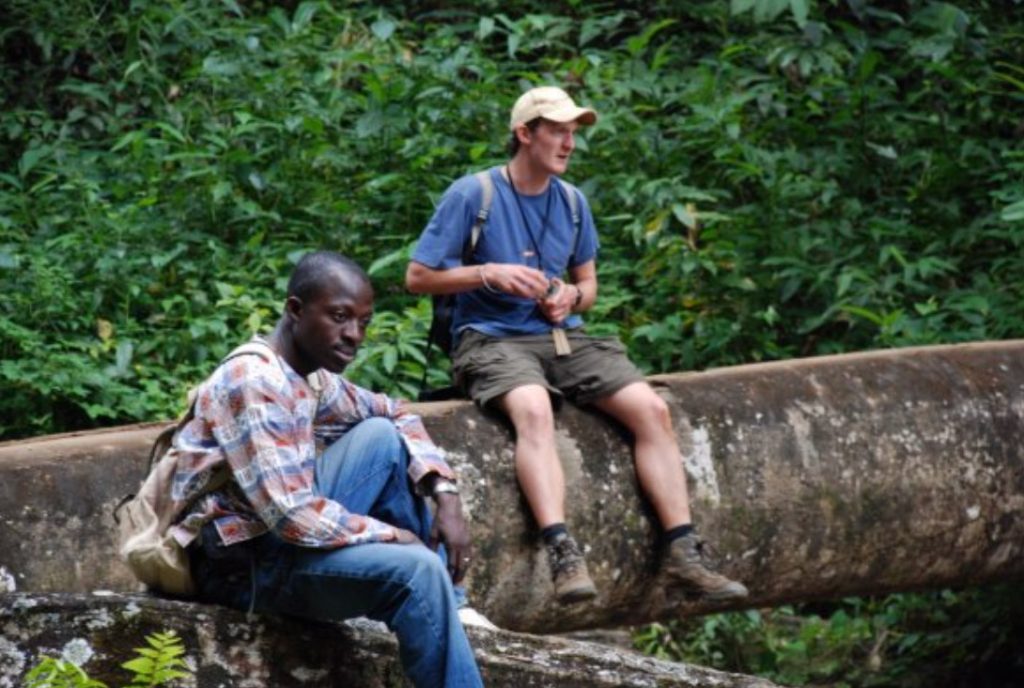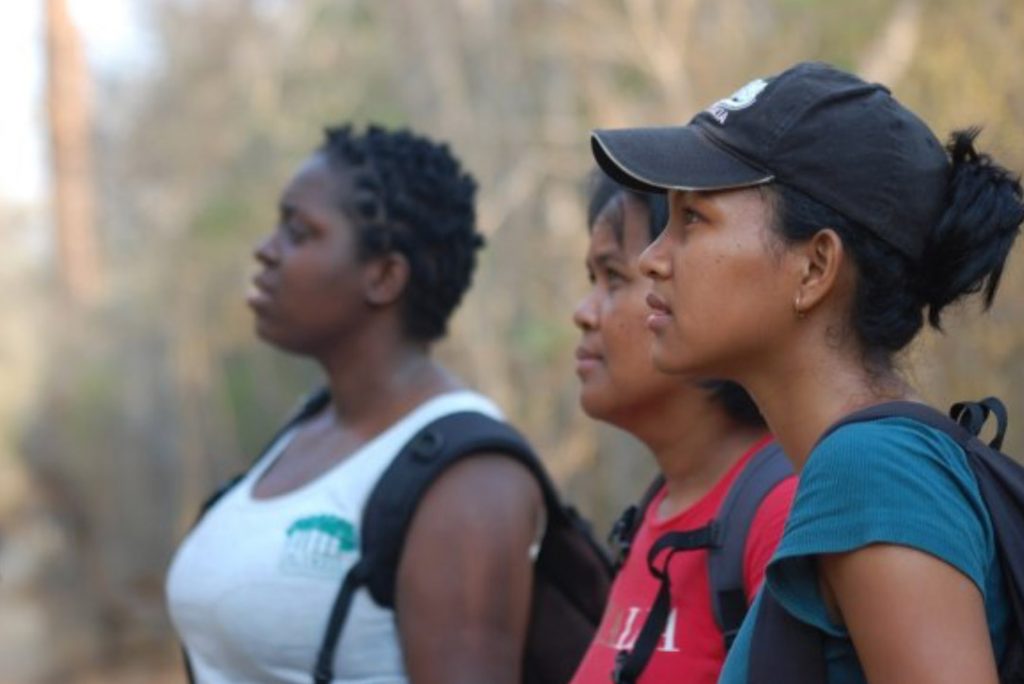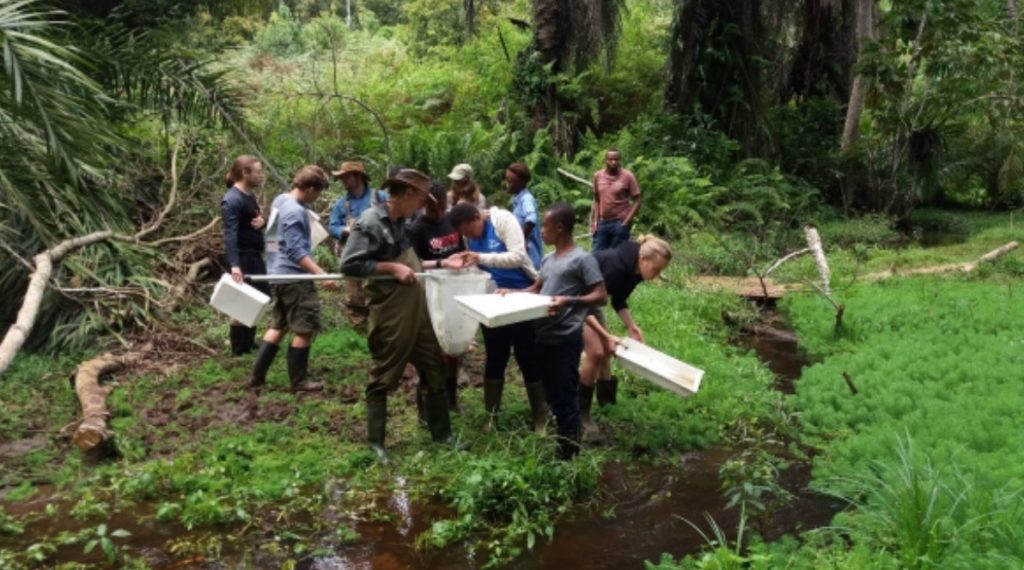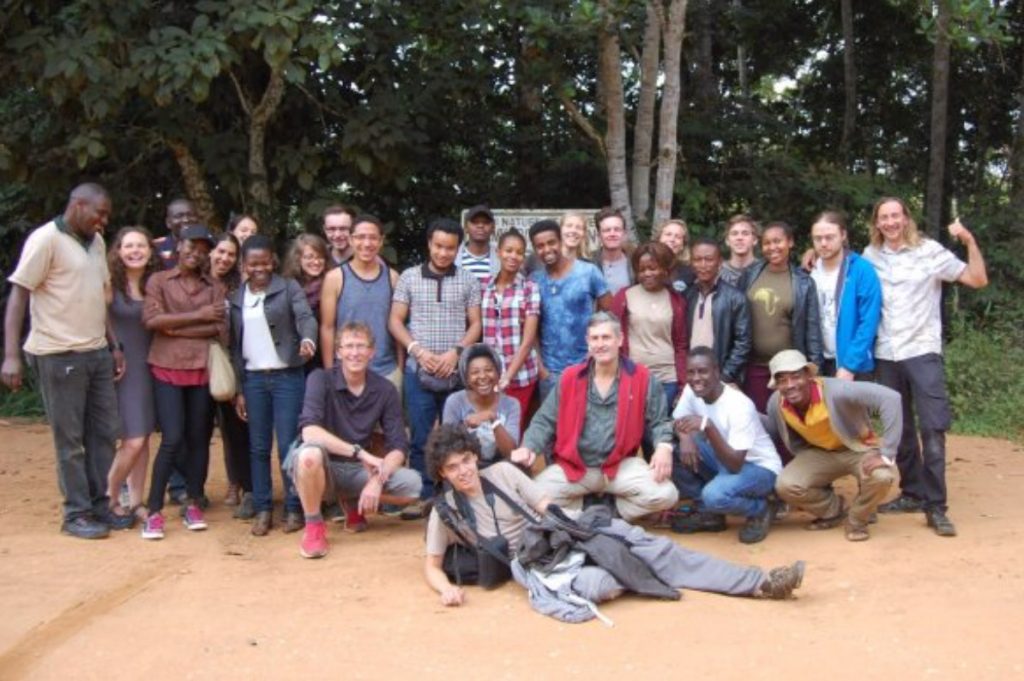
Olly van Biervliet (right) author of this article as a student in 2007 being inspired by a Tropical Biology Association course.


Olly van Biervliet (right) author of this article as a student in 2007 being inspired by a Tropical Biology Association course.
November 9, 2020
I am coming to the “end of the beginning” of a project to build capacity in freshwater management in Africa. The inspiration for the project came in 2014 during my first job in nature conservation working for Norfolk Rivers Trust. The Rivers Trust movement was starting to blossom in the UK as a very effective vehicle for positive change in freshwater environments stemming from the passion of Rivers Trust employees and fact that the Trusts are embedded within communities so benefit from local support. Consequently, Rivers Trusts are increasingly used to deliver UK government imperatives to improve the degraded state of our freshwater ecosystems. Having completed training with the Tropical Biology Association (TBA) in Tanzania several years before, it stuck me that much of the Rivers Trust work could be applicable to an African context because some of the most meaningful works was: 1) low cost – e.g. by persuading landowners to change agricultural practice, and 2) much of the work centred around rectifying the mistakes (e.g. dredging rivers, encroachment of infrastructure onto rivers, erection of barriers to fish passage) that were made as Britain developed without consideration for the environment. Could such mistakes be avoided in the evolution of developing countries? In conversation with Rosie Trevelyan, Director of the TBA, it became apparent that there was certainly an urgent need for capacity building in the interdisciplinary core skill set required for freshwater management in Africa. We sketched out a proposal, but with little time to spare, it was several years before I would have a chance to develop the vision into a reality. In 2019, I approached Van Walt Ltd (who were already supporting my PhD with equipment), and asked if they might see the benefit of making an internship possible by funding my time. I was thrilled when, after careful scrutiny of the idea, and several useful suggestions, Vincent Van Walt and Tracey Daley agreed that Van Walt would fund the internship!
I have now been working on the internship with TBA for 3 months and activities have included: searching for funders, reaching out to my network within the water industry to find funders, exploring the potential for partnership with various organisations, researching where the greatest need is within freshwater management in East Africa, writing the course syllabus, costing up the equipment which would be needed, preparing publicity materials, and filling in funding bids. Perhaps the greatest single achievement is that TBA now have an understanding with academics at IHE Delft Institute of Water Education, the biggest water training institute in the world, based in Holland, to work together to deliver the course and co-develop funding opportunities. Additionally to this, a funding bid has been prepared to a major funder that TBA has applied to successfully before. We are crossing our fingers that this will be successful. I have also prepared a fully costed syllabus, timeline and publicity materials for the course, as well as linking up with potential teachers. I look forward to writing an update when/if we hear good news from our potential funders!

The philosophy of the Tropical Biology Association is that Africans are best place to manage their own resources, so it is vital to train tomorrow’s leaders in water management.
As my research into East African freshwater management progressed it became increasingly clear that, whilst there were several exciting projects underway, a regular complaint was the lack on reliable monitoring data to support projects. Therefore, an appropriate focus for the course would be building capacity in monitoring freshwater environments (hydrometric monitoring, biomonitoring and water quality), whilst also making participants aware of the suite of nature-based solutions available to resolve problems such as nutrient enrichment (e.g. wetland restoration, reforestation, soil protection measures in agriculture). A month-long field-based training course aimed at appropriate practitioners and researchers will aim to build capacity in these skills. Senior policy makers (with whom TBA have good links, in organisations such as National Environment Management Authorities in Kenya and Uganda) will input into the course giving participants cutting edge knowledge about policy. In addition to the proposal for this training course the potential for exciting collaborations between the TBA and 1) Earthwatch’s Freshwater Watch programme and 2) the Wildfowl and Wetlands Trust in Madagascar are currently under discussion. Discussions about these projects have continued until the last day of my internship and the TBA and I will continue to pursue them.

TBA students being trained in river invertebrate monitoring in Tanzania.
For me personally, the world has changed a lot in the three-month duration of this internship. This is for several reasons. Of course, the dreaded Corvid-19 virus has led to a substantial re-structuring of how we live our lives. Moreover, my wife has brought a delightful baby daughter into the world, bringing, as I am sure it does to all new parents, a new perspective on life. The internship itself has been an exceptional moment for personal development and broadening of my horizons. The scale of the challenge in water management for East Africa and Madagascar is stark – African countries, many of which are already water stressed, aim to increase water use by five-fold for agriculture (United Nations Water 2003). The scale of environmental degradation in Madagascar (e.g. 90% loss of forest cover), and ineffectiveness of current conservation measures to protect freshwater life is salutary (Benstead et al. 2003; Bamford et al. 2017). However, there are also instances of great ingenuity in the face of these problems. Water Funds in Nairobi and Cape Town have deployed the wealth of urban companies such as Coca-Cola in protecting and restoring headwaters, upon which they depend for clean water, reversing land degradation, supporting sustainable livelihoods and reforesting large areas. I have found out about TBA alumni who are setting up the first university degrees for nature conservation in Burundi, are striving to protect the West African slender-snouted crocodile and who re-discovered the world’s rarest bird in Madagascar. In partnership with IHE Delft, the largest water training institution in the world, I am hopeful that the TBA can start to similarly inspire and enable a new generation of freshwater managers. Glancing at my tiny daughter rocking herself in a baby bouncer as I write the last lines reinforces my motivation to do all that I can to improve the management of our natural world.

Tropical Biology Association students after another successful course in Tanzania.
Oliver van Biervliet
Bamford AJ, Razafindrajao F, Young RP, Hilton GM (2017) Profound and pervasive degradation of Madagascar’s freshwater wetlands and links with biodiversity. PLoS ONE 12:1–15.
Benstead JP, Rham PH De, Gattolliat J, Loiselle P V, Sartori M, Sparks JS, Stiassny MLJ, Rham PHDE (2003) Conserving Madagascar’s Freshwater Biodiversity. Bioscience 53:1101–1111.
United Nations Water (2003) The Africa Water Vision for 2025: Equitable and Sustainable Use of Water for Socioeconomic Development. Addis Ababa, Ethiopia
We need to make clear, that at the time of writing, there are no ISO or EN standards which deal with the sampling of groundwater for PFAS.
Read MoreEnvironmental monitoring has developed considerably over the years. From the time when a consultant went out monthly or quarterly with a dip tape to monitor the groundwater level in a borehole, wind forward...
Read MoreThe interest in Nitrates is nothing new. One way or another we have been measuring them for half a century.
Read MoreA small selection of our environmental equipment